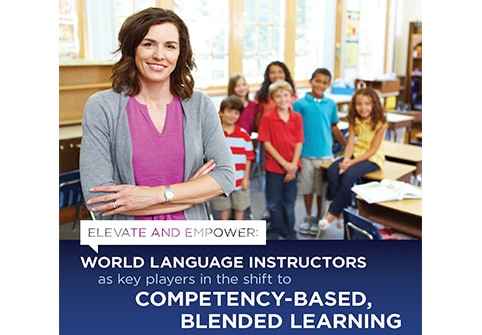Elevating and Empowering World Language Teachers

“We have been doing ‘blended learning’ since before it was called that. Like with performance based assessments, it’s just what we do to get our kids to communicate in the target language for meaningful purposes.” That’s what one of the teachers we interviewed had to say when asked if world language educators are uniquely poised to advance innovations in teaching and learning.
Last year, Getting Smart partnered with Rosetta Stone to release a report called “The Next Generation of World Language Learning.” This week we launched a paper called “Elevate and Empower: World Language Instructors as Key Players in the Shift to Competency-Based, Blended Learning” from same team of authors – Tom Vander Ark, Carri Schneider, Moss Pike and Winifred Kehl.
The goal of our first report was to create a vision for world language learning that acknowledged its role in global competency and to frame the vision inside broader shifts to personalized learning and blended instruction. Pointing to the potential of educational technology, we advocated for accessible, high-quality world language instruction for all students—from elementary through high school.
With a focus on the student perspective, the first report described design principles for next-gen world language learning.
- Immersion
- Mobile learning
- Student-centered collaboration
- Interdisciplinary work
- Game-based learning & augmented reality
- Standards-based grading
- Reorganization of physical space
The report was well-received by the world language community, and we were honored to participate in discussions with teachers across the country who meaningfully connected with the report’s goals. During a presentation of the report’s findings to the ACTFL World Language Expo, one such conversation launched us toward the path of this follow-up report.
Whereas the first paper focused heavily on the student perspective, this report focuses on the teacher. “Elevate and Empower: World Language Instructors as Key Players in the Shift to Competency-Based, Blended Learning” explores two key questions:
- Are world language educators uniquely poised to act as leaders in system-wide shifts to new models of personalized learning?
- How can world language educators be elevated and empowered to lead this charge?
To answer these questions, we conducted a review of the existing research on world language teachers and technology, and we set off to learn from a group of teachers and leaders who have led shifts in their own school communities.
This paper explores our findings through a collection of “Leaders in the Shift” stories that describes teacher-driven transformation from traditional world language instruction to blended, competency-based models. The stories reveal unique drivers, pathways and destinations—with a common thread of personal and professional evolution. Our conversations also revealed six key trends: bottom-up adoption, entry points, personalized media, cultural fluency, slow and steady shifts and the value of the professional learning network.
Our top three discoveries from talking to blended, world language educators:
- The nature of language study is well suited for the rapidly evolving global classroom and new models of teaching and learning.
- World language teachers tend to be out in front of technology use and can thus drive innovation in their wider school communities.
- World language teachers who use technology can pursue cultural fluency and globalization to offer a powerful and compelling model for Deeper Learning.
This report ends with a set of recommendations for stakeholders ranging from school leaders to content providers. These recommendations intend to “elevate and empower” world language educators as leaders in the shift to personalized learning.
In addition to the paper, we also released an infographic that provides a useful overview of the information.
Download the full paper.
Join the conversation on Twitter with the hashtags #WorldLanguage.







0 Comments
Leave a Comment
Your email address will not be published. All fields are required.